Corporate Social Responsibility Policy
The company’s Board of Directors has assigned the Corporate Governance and Sustainability Committee to oversee good corporate governance
and sustainable development, which includes setting sustainability performance goals, monitoring performance results, as well as overseeing and setting operational targets related to climate change.
The Chief Sustainability Officer is responsible for monitoring and supervising the sustainability activities of the group companies. A Sustainability Working Group has been appointed, consisting of senior executives from key business units, to oversee the development and implementation of the organization’s sustainability strategy and to present sustainability reporting guidelines to the committee and the Board of Directors.
The Board of Directors has established a Vision and Sustainable Development Policy to serve as a framework for operations and to demonstrate its commitment to being a good role model and developing business sustainably in economic, social, and environmental dimensions. The company intends to conduct business based on good governance with responsibility to communities, society, and the environment.

THG’s Sustainable Development VisionMedical Sustainability
THG aims to become a leader in sustainable development in the ASEAN healthcare industry by 2050.2593
THG is committed to becoming a leader in sustainable development in the ASEAN healthcare industry, conducting business with environmental and social responsibility throughout the entire value chain. This commitment is driven by operational excellence, transparency, stakeholder engagement, and adherence to human rights principles under good corporate governance aligned with international standards. It also includes supporting the Sustainable Development Goals (SDGs) to ensure business growth while fostering sustainable social development.
The company has defined strategies and operational approaches across three key dimensions as follows:
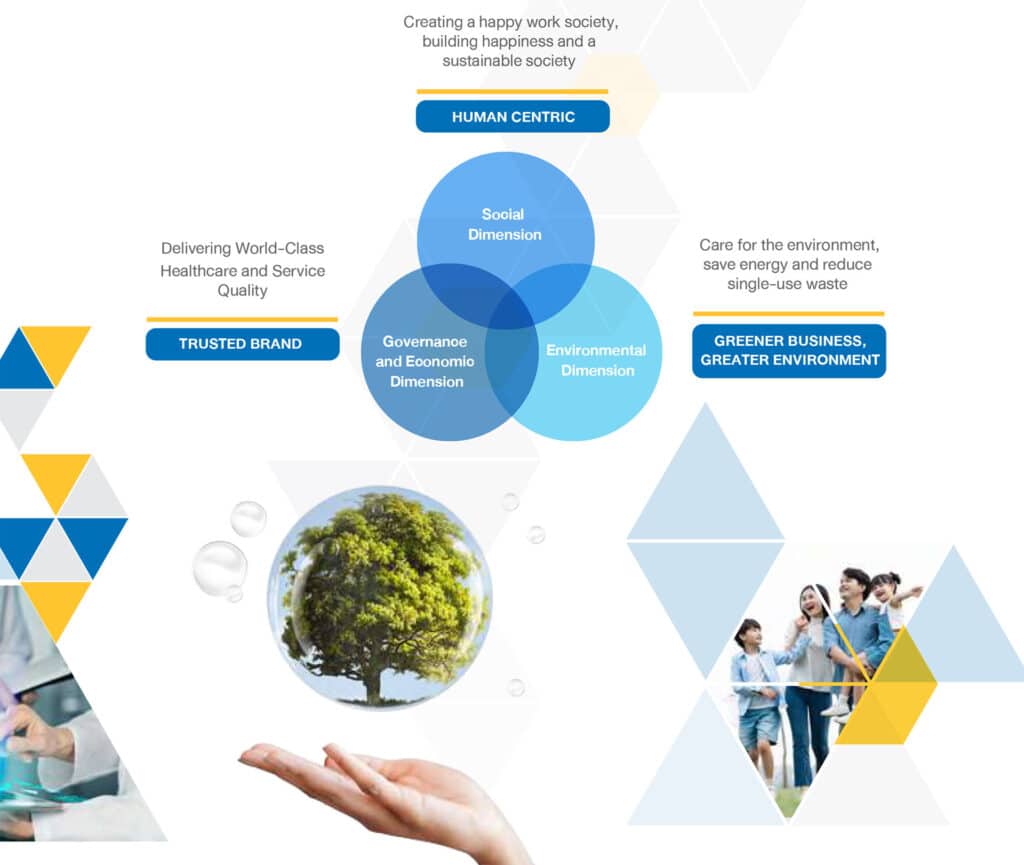
Governance and Economic Dimension
Trusted Brand Delivering World-Class Healthcare and Service Quality
Provide quality service with modern technology and a team of experts, serving as trusted healthcare providers for all age groups, with customer health and needs as the top priority.
Building brand identity by creating impressive business-customer relationships, making customers happy and fostering loyalty to the company.
Collaborate with domestic and international partners to create business expansion opportunities, build image, and demonstrate Thailand’s medical service potential and standards to foreigners.
Commit to creating and developing business to create shared value between business and society, not just providing treatment, but also promoting and supporting good health for people of all classes and ages.
Seek investment opportunities to strengthen and create continuous growth, particularly focusing on addressing Thai and regional public health issues, such as the demographic shift to an aging society.
Drive and expand business to keep pace with technological changes, to be a leader in medical innovation and technology
Social Dimension
Human Centric Creating a happy work society, building happiness and a sustainable society
- Regularly provide training and capacity development for doctors, nurses and staff at all levels on important business-related issues and sustainability topics.
- Regularly conduct drills to prepare for emergency situations and emerging diseases, ensuring executives, medical personnel, and employees at all levels are skilled and can respond to and manage all crises professionally.
- Develop personnel in both academic and specialized expertise to increase treatment effectiveness, alongside ethics, to build organizational excellence.
- Develop the quality of life of communities and society with care, concern, and sharing.
- Participate in social responsibility by campaigning for and promoting health activities and good hygiene.
- Regularly conduct training and testing to remind executives, doctors, nurses, and employees at all levels, resulting in business operations under good corporate governance that are transparent, fair, and ethical, as well as compliant with laws and regulations, continuously maintaining this as part of the culture.
- Develop the quality of life of doctors, nurses, and employees at all levels to enhance satisfaction and create work-life balance for everyone, increasing organizational engagement.
Environmental Dimension
Greener Business, Greater Environment Care for the environment, save energy and reduce single-use waste
- Develop Knowledge Management in the area of non-hazardous waste management from departments that have successfully implemented plans (Best Practice) to serve as a model for operations across all sectors of the organization.
- Preserve the environment, control and supervise waste disposal management, including various contaminants, by using efficient technology and continuous monitoring to prevent environmental impact.
- Promote energy conservation, natural resources, and environmental protection for better quality of life in society through environmental management and global warming mitigation from climate change by saving energy and proper waste management.
- Instill awareness in company personnel to be responsible for society and the environment.
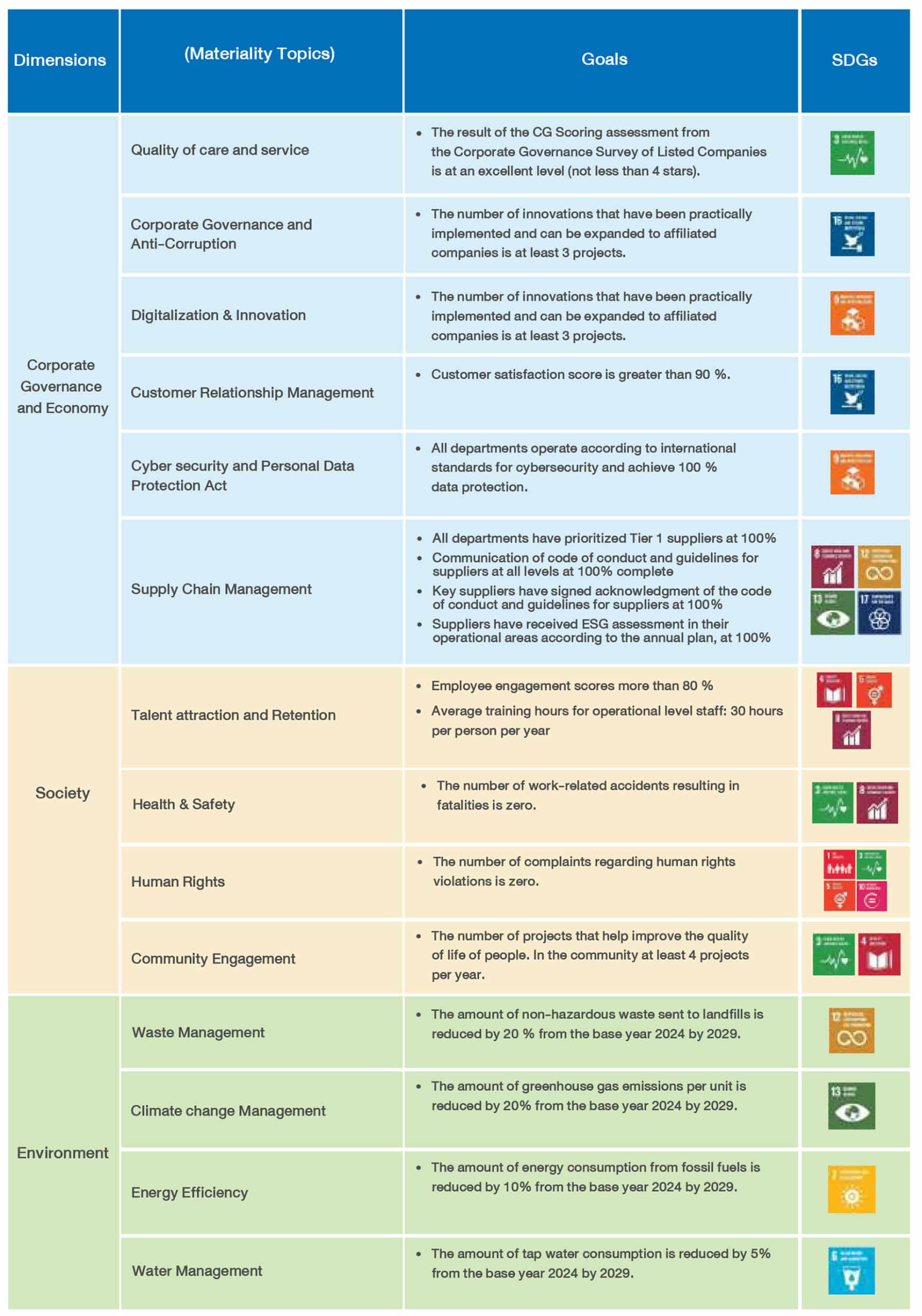
Business Value Chain
The company’s board of directors is committed to conducting business under ethical principles and good corporate governance practices, alongside taking responsibility for the community, society, and the environment throughout the company’s value chain. This is considered in both the core activities and supporting activities involved in the company’s operations.
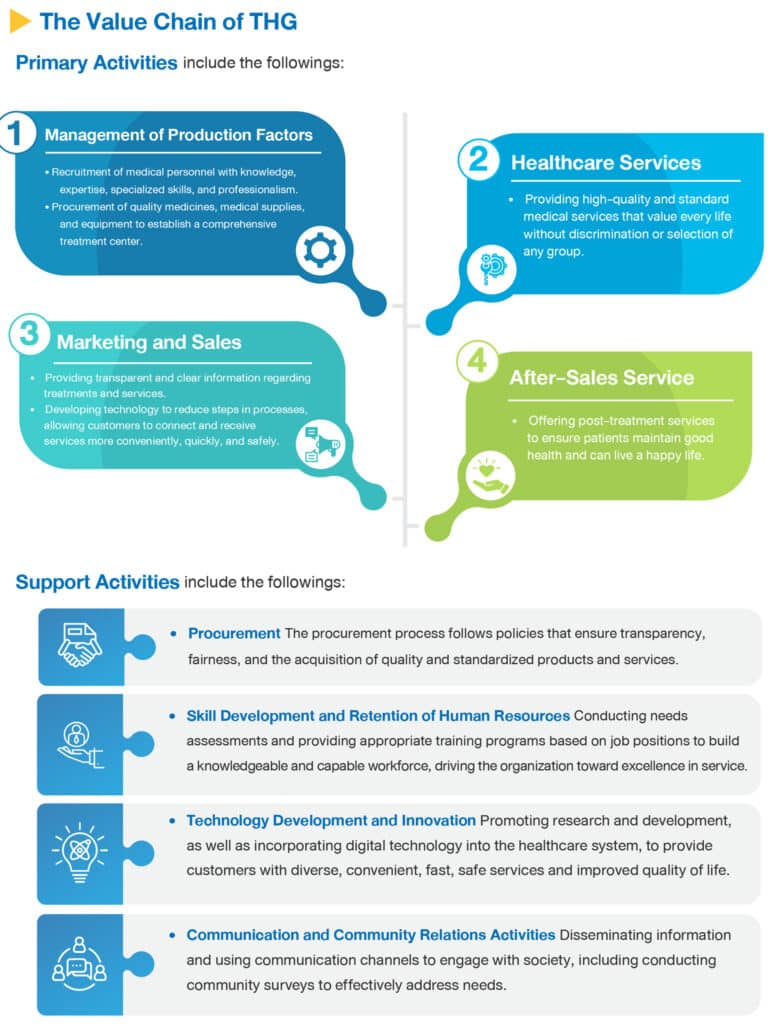
Analysis of Stakeholders in the Business Value Chain
THG has surveyed, analyzed, and prioritized its stakeholders by considering the impact level of the company’s operations on the stakeholder groups and the influence level of the stakeholder groups on the business operations. This approach ensures that the company’s responses to stakeholder expectations are appropriate. Responsibilities, duties, and operations are aligned with the company’s defined guidelines. The needs and expectations of stakeholders are reviewed once a year, and response methods are adjusted accordingly. In 2024, THG’s stakeholders can be categorized into 8 main groups:
(1) Patients and service users
(2) Medical personnel and employees
(3) Business partners
(4) Shareholders and investors
(5) Business partners (government, private sector, universities)
(6) Regulatory agencies
(7) Media
(8) Communities The operations are carried out as follows:
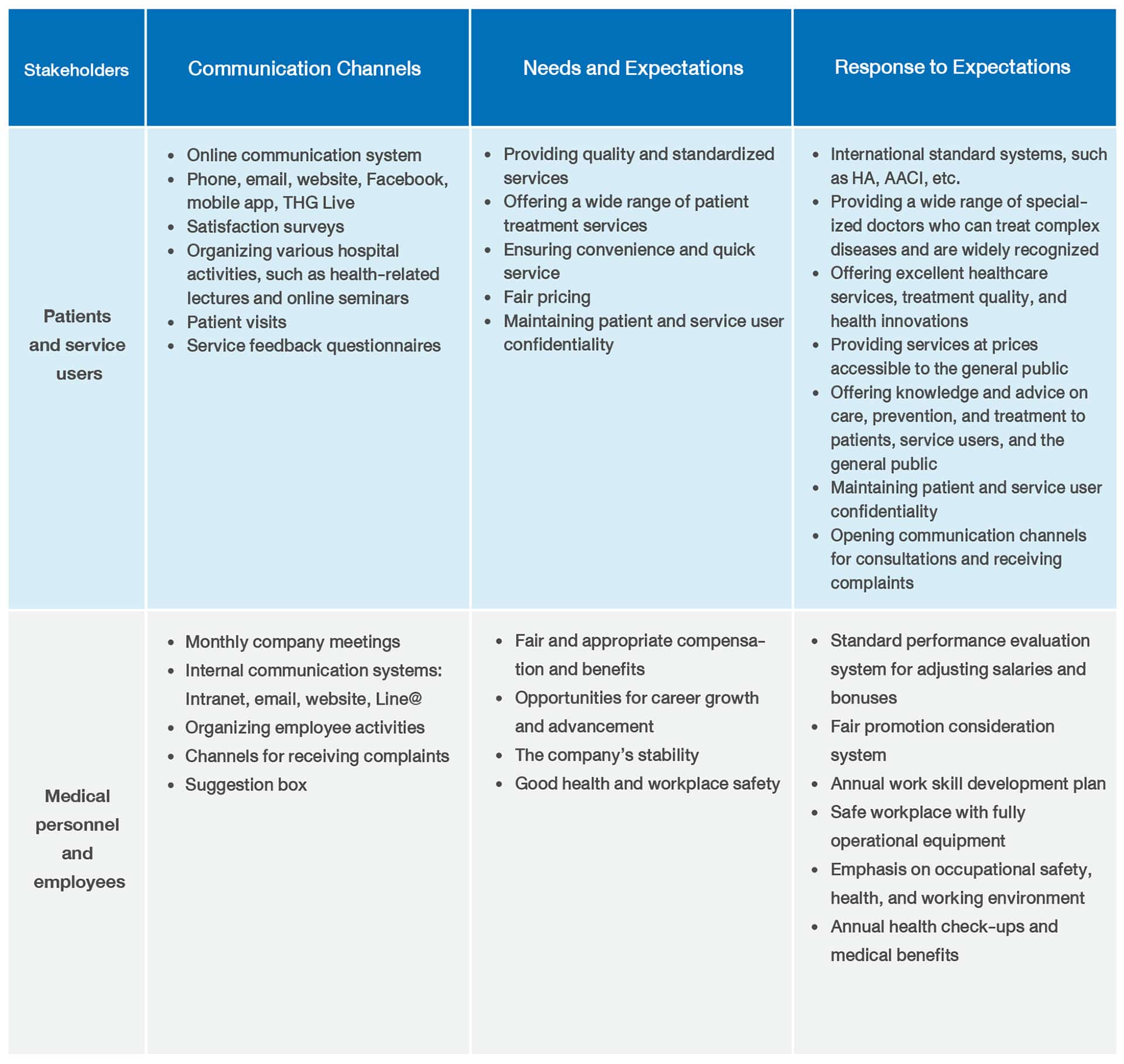
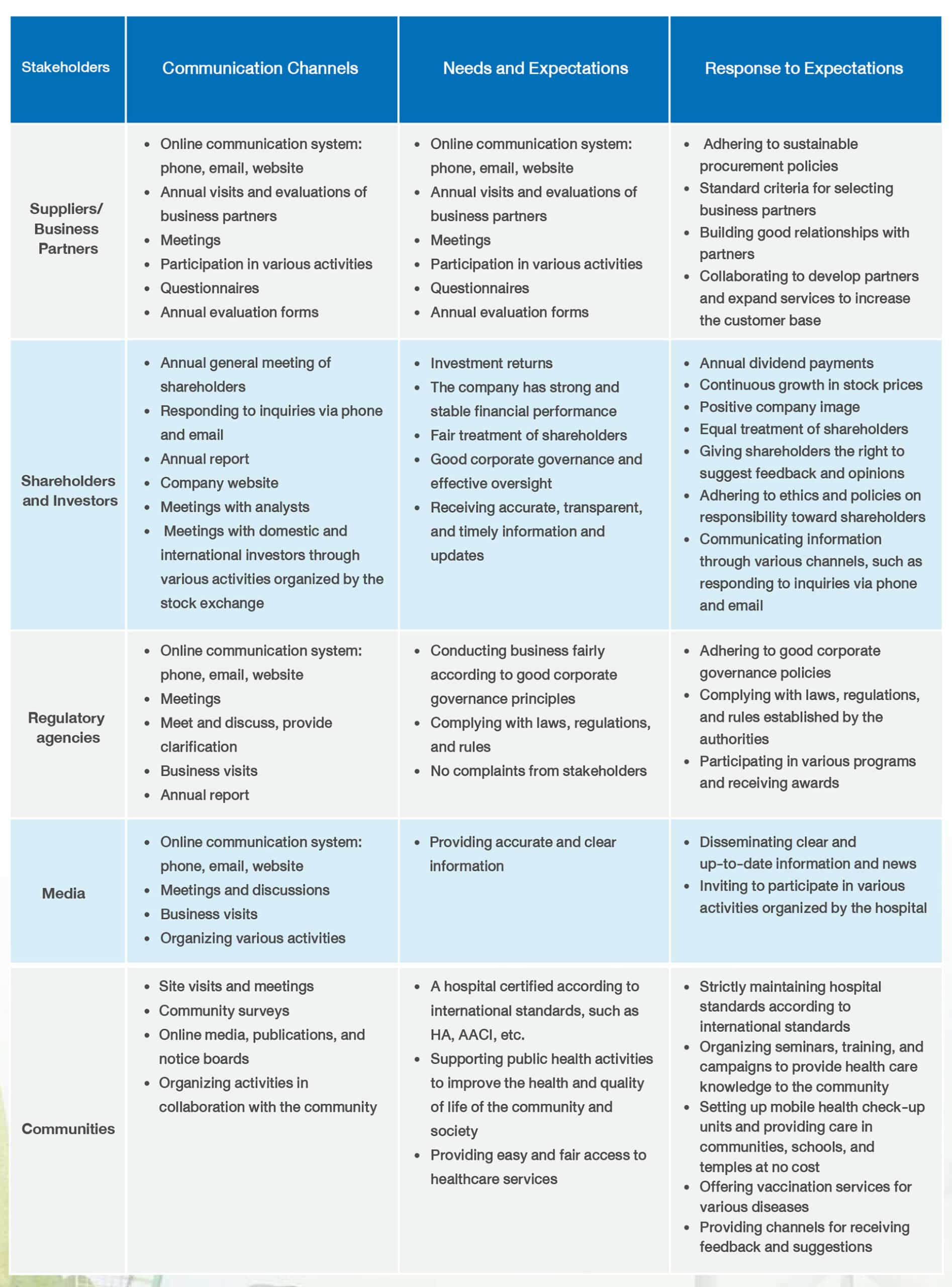
Analysis of Stakeholders in the Business Value Chain
THG has conducted a materiality assessment of sustainability issues in collaboration with all stakeholders, focusing on issues that have significant impacts on business, society, and the environment.
The assessment analyzes sustainability risks and opportunities based on the organizational context, expectations, and concerns of all stakeholders. It examines risks and opportunities throughout the value chain, combined with an analysis of business direction, global sustainability trends, emerging risks, and significant global changes that may occur. It also includes topics for sustainability assessments by various agencies such as SET ESG Ratings, FTSE Russell, etc., and is compared with the materiality assessment and reporting indicators according to GRI (Global Reporting Initiative) standards, as follows:
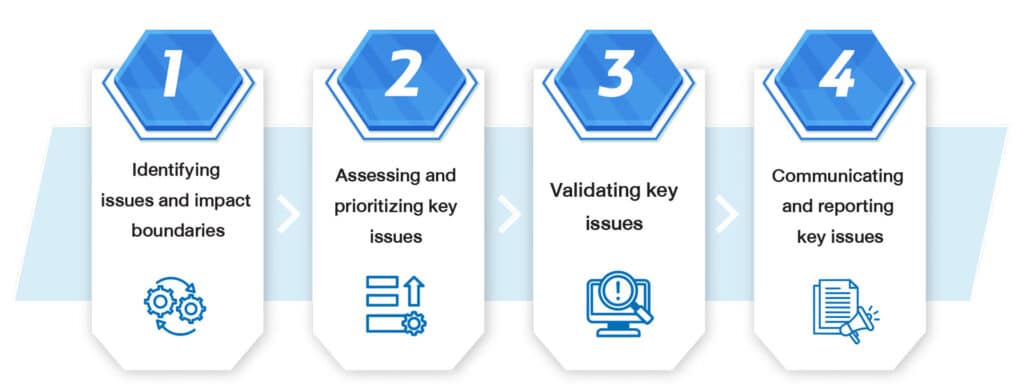
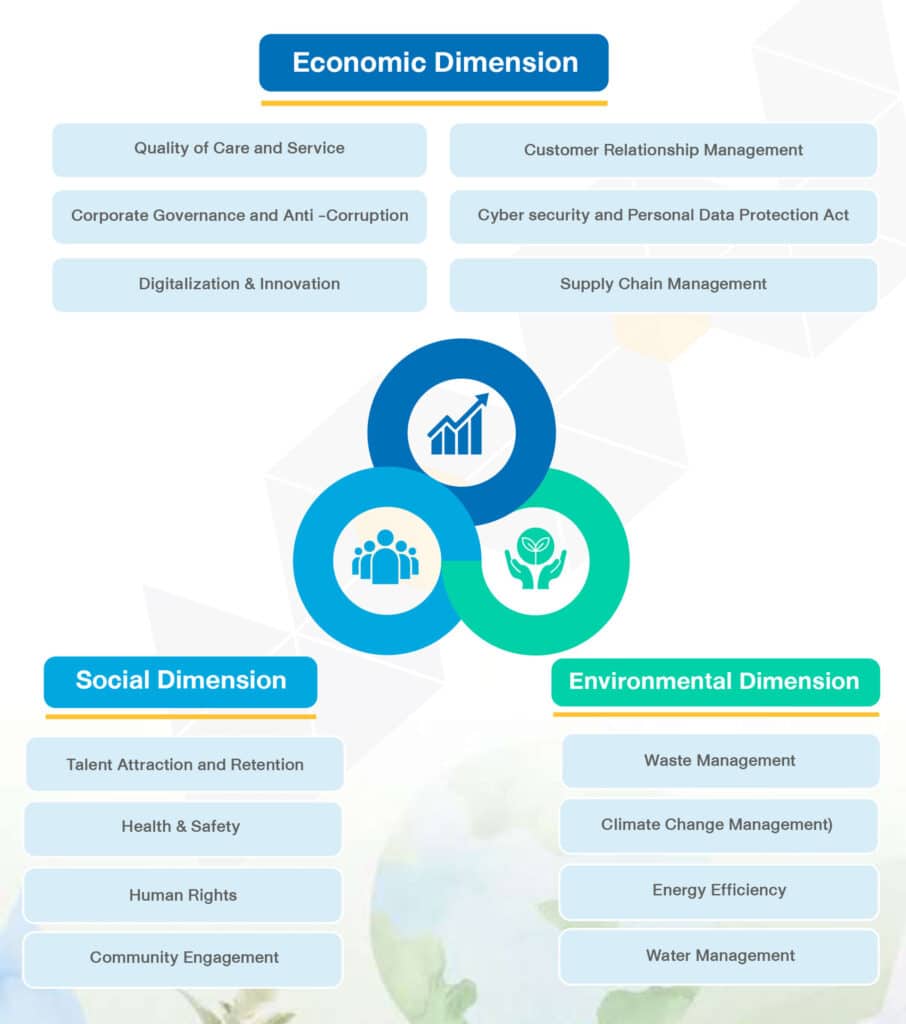
Sustainability management in the dimensions of corporate governance and economics
G1 : Quality of Care and Service
THG places great importance on maintaining high-quality healthcare standards to ensure that patients receive safe and excellent services, promote equality, and reduce disparities in access to care. It aims to provide healthcare for people of all ages to ensure a good quality of life (Lifetime Health Guardian for All). THG’s philosophy is that every hospital in its network must adapt to changes and continually develop to meet the needs of service users. Social changes are a key focus, and THG is committed to delivering services that foster satisfaction, confidence, and responsibility toward both service users and society.
THG requires all hospitals in its network to establish policies and guidelines for quality management that align with both national and international standards. This includes the creation of quality development structures, quality policies, quality plans, manuals, and support for operations to ensure the highest safety standards for patients.
THG encourages its hospitals to seek medical service accreditation at both national and international levels, which serves as a comprehensive operational framework for managing all aspects of hospital services to ensure the highest level of patient satisfaction. The accreditation process includes the evaluation of quality management systems, patient safety measures, and considerations for both service recipients and medical personnel.
G2 : Corporate Governance and Anti-Corruption
THG recognizes the importance of good corporate governance as a crucial factor in promoting the company’s operations effectively and ensuring sustainable growth, which will lead to maximum benefits for all stakeholders, including doctors, nurses, shareholders, partners, and other stakeholders. The company’s corporate governance policy covers the structure, roles, responsibilities, and duties, providing a framework for organizational management that ensures confidence that all operations are fair and consider the best interests of shareholders and all stakeholders.
The company operates with a focus on the following key principles:
• Transparency: THG is committed to providing accurate, clear, and complete information on time through various communication channels.
• Accountability: The company’s directors, executives, and employees must adhere to laws, ethical standards, and company policies while considering the interests of all stakeholders.
• Equality: Treat all stakeholders equally without discrimination.
• Fairness: Conduct business fairly by making decisions based on clear and transparent criteria.
• Social Responsibility: Acknowledge the impact of business activities and strive to operate responsibly toward society and the environment.
In 2024, THG received an excellent CG Scoring result in the Corporate Governance Survey for listed companies. More details can be found in the “Corporate Governance Structure” section.
G3 : Digitalization & Innovation
Digital technology and innovation are of great importance in the present era, as they have significant impacts on the economy, society, education, and the daily lives of people. With the goal of becoming a leader in providing comprehensive healthcare services, delivering the highest-level service experience, and continuously improving business operations, THG emphasizes the development of innovation both in internal organizational processes and through collaboration with business partners, educational institutions, and leading health technology organizations.
The company focuses on developing services that create differentiation and exceed expectations, while simultaneously generating value for society and the environment. As a leader in healthcare in Thailand, THG aims to elevate healthcare standards and provide services that quickly and efficiently meet the needs of its customers. THG’s Vision on Innovation
G4 : Ccustomers Relationship Management (CRM)
THG is committed to building strong customer relationships and prioritizes building strong relationships with customers by continuously improving service quality through listening to feedback and understanding customer needs. THG recognizes that effective communication and trust-building are key to long-term success.
THG’s Commitment to Service
Hospitals under THG focus on providing compassionate care, reducing patient stress through clear information and efficient services.
Emphasis on Patient Experience
THG-affiliated hospitals prioritize patient satisfaction by conducting surveys and using feedback to design patient-centered processes. Patients can share their opinions through forms or QR codes provided by the hospital.
G5 : Cyber security and Personal Data Protection Act
Cybersecurity
THG has increasingly adopted innovations and technologies to drive the business in the form of digital healthcare, aiming to improve the efficiency and performance of doctors and nurses. Examples include the Electronic Medical Record (EMR) system and Telemedicine system, among others. As a result, THG recognizes the importance of effectively managing and securing information technology systems continuously. The company acknowledges the potential risks of personal data breaches, which may lead to legal, reputational, and financial damages, such as cases involving lost or stolen data. Therefore, THG has established measures and policies, along with appropriate resources, to ensure the safety of its IT systems and ensure they are trusted and compliant.
Information Security Policy and Operational Guidelines
The policy aims to demonstrate the direction of THG’s management regarding information security and to ensure that those involved with the organization’s data adhere to and apply it in their operations. The goal is to ensure that the management of the organization and employees working with information systems or data-related systems have sufficient information security management in place to support current and future business operations.
The policy and practices for ensuring the security of information technology at the hospital and subsidiaries of Thonburi Healthcare Group are reviewed annually, with the most recent review and approval taking place on 17 July 2023.
G6 : Supply Chain Management
THG has a supply chain management approach that integrates sustainability issues and has established a sustainable procurement policy*, as well as a code of conduct and guidelines for business partners to ensure that employees and business partners of the company and its affiliates adhere to and practice all three dimensions: environment, society, and governance.
Sustainability Management in the Social Dimension
Thonburi Healthcare Group Public Company Limited and its subsidiaries, as a company listed on the Stock Exchange of Thailand (SET) and operating in the healthcare sector, are mindful of their responsibility to society and adhere to good corporate governance principles. The company places significant emphasis on social dimensions to demonstrate its commitment to driving the business towards sustainability. The company has established policies and practices in social responsibility, including respect for human rights and fair treatment of workers, promoting health and safety in the work environment, employee development, employee retention and motivation, community and social involvement, as well as systematic stakeholder engagement. This is to ensure that the operations of the hospitals and subsidiaries of THG are comprehensive and sustainable in terms of social dimensions under the “Human Centric” strategy, creating a happy work environment and a sustainable society.
- S1 : Talent attraction and Retention
- S2 : Health & Safety
- S3 : Human Rights
- S4 : Community Engagement
Sustainability Management in the Environmental Dimension
THG recognizes and prioritizes environmental stewardship to maintain a balance between corporate growth and the preservation of natural resources while minimizing environmental impacts from business operations. The company has established policies and operational guidelines that align with its sustainability vision and strategy, ensuring effective management of environmental impacts. THG strictly adheres to relevant environmental laws and regulations while actively promoting awareness and cooperation among employees at all levels. This commitment fosters a green culture within and beyond the organization, encouraging collective responsibility for environmental conservation.
In 2024, the company conducted environmental training programs related to various operational practices, such as proper waste segregation, wastewater treatment management, organizational carbon footprint assessment, and greenhouse gas emission reduction. A total of 4,030 employees participated in the training and knowledge assessment on environmental and social policies.
To ensure effective environmental management and the achievement of set goals, the Board of Directors has assigned the Corporate Governance and Sustainability Committee to establish policies and oversee
implementation. Additionally, environmental task forces have been set up at each hospital, fostering participation from all departments in environmental management and continuous improvement efforts. The Chief Sustainability Officer (CSO) is responsible for supervising and monitoring the performance of the Environmental (ENV) Task Force, which is tasked with developing operational plans, setting objectives and targets, and implementing projects aligned with key sustainability and environmental priorities. These include enhancing energy efficiency, increasing the proportion of renewable energy use, reducing resource consumption, managing single-use waste, and minimizing water usage.
- E1 : Waste Management
- E2 : Climate Change Management
- E3 : Energy Efficiency
- E4 :Water Management
